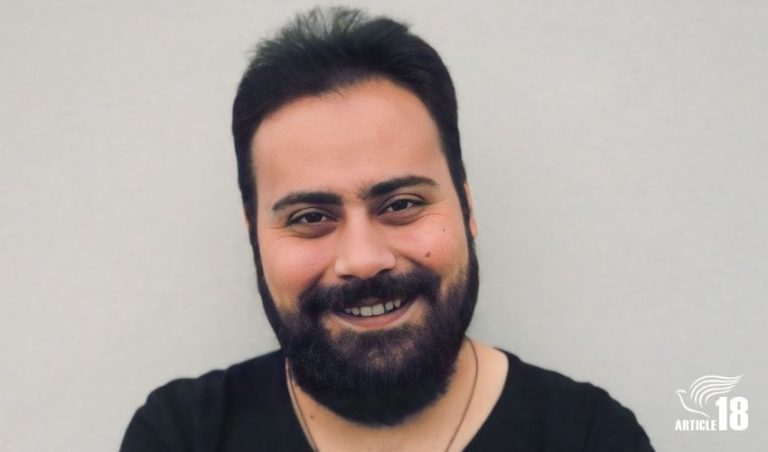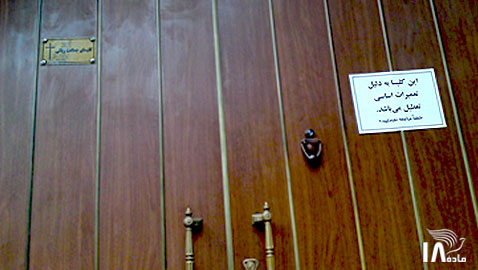Among the many challenges Iranian Christians face following arrest are the various cunning techniques used by interrogators in an attempt to sow seeds of distrust between them and their fellow house-church members. Many former prisoners have also described being placed under immense psychological pressure – including through the use of “white torture” – to divulge information about their Christian activities, as well as those of others. As a result, the more experienced detainees have learnt how to share only information that is unlikely to be used against them or others.
Embed from Getty ImagesEven today, suspicion follows Hassan*.
It’s been years since his acquittal from a long prison sentence, and some still question how he was able to escape.
Was it by divulging information about the activities of the house-church network of which he was a part?
Was he a spy of Iran’s Ministry of Intelligence all along?
To these questions, Hassan has this response:
“I was in prison for nearly a year. I was under persecution. I was in a hard situation that I couldn’t contain. If I was a spy, a few months would be enough! If I was a spy, why should I have been sentenced to years in prison in the first place?”
Yet ever since Hassan’s first arrest, more than a decade ago, suspicion has been hanging over him.
In the years since, Hassan has faced rejection from friends, church members, church leaders, and even from some international Christian agencies.
He says “the feeling of being rejected by your brothers” has been “heartbreaking”.
“You’re serving God faithfully, in your opinion. I don’t say I was perfect, but I was trying my best to be faithful to the Lord. And then your brothers accuse you and reject you, and bring persecution.”
And whatever led to the suspicions in the first place, there is surely little that could bring more pleasure to the Iranian authorities than sowing distrust among the mushrooming house-church networks it has otherwise struggled to contain – whether founded or unfounded.
Indeed, when Hassan recalls his initial arrest, he says it was a clear tactic of the intelligence agents – “to give the feeling that somebody among you was one of them and leaked information to them”.
During one interrogation session, Hassan recalls being brought the typed text of a recent telephone conversation he’d had with a fellow convert.
“They read it for me and said, ‘This guy, he is one of our intelligence service spies. He leaked information.’ He read that: ‘I called Hassan and I said, “Where are you?” And Hassan laughed and said “I’m on the way”.’
“I understood that they listen to your phone calls, and they write it down. And they try to make us paranoid.”
If that was their intention, it certainly worked.
When Hassan was arrested a second time a few years later, he says some international Christian media decided not to publicise his case because of the doubts surrounding him.
“Why? Because from the beginning, they decided to believe Hassan was the spy. So they didn’t cover any news about me.”
Eventually Hassan’s case was reported, but only, he says, after some fellow Christian prisoners spoke out in his defence.
“There are still rumours among some Christian leaders that Hassan is a spy,” he says. “Or maybe the intensity of it has decreased, but some still decided to believe that even though Hassan is not a spy, he leaked information during interrogation.”
This last part, Hassan admits, is at least partially true.
“I had to tell them something,” he explains. “Because they already knew some stories, and I had to show them that ‘I’m telling you the truth’.”
So when Hassan was asked who had participated with him in his Christian activities, he gave them a name. But Hassan stresses that “the intelligence service already knew that he was with me”.
“So this kind of safe information that they already knew, these kinds of things, I gave just to show them that I’m ‘telling the truth’,” he says.
“Every five days they were interrogating me. And during these days, I was making up stories for myself, just to give them a safe account of what I did in my ministry.
“I had to come up with a story, and I had to never forget the story. So, during these five days, I was repeating it to myself.”
When, eventually, the intelligence agents discovered Bibles and lots of other Christian literature that Hassan had hidden in his flat, he says he was “heartbroken”.
“They said, ‘Why didn’t you tell us that you had these books?’ And I said, ‘Because in the stories, the news, I’ve heard that you are burning these books. And because of that, because it’s the book of my faith, I didn’t want it to be burned’.”
Hassan and his wife fled Iran a year after his release from prison. He says they tried to flee just a month after his acquittal, but that at the border he was told there was a mark against his name saying that if he left it would “threaten national security”.
Six months later they tried again, without success, but eventually they managed to flee over the mountains to Turkey.
Years later, Hassan says he is doing “really good”, even if he still bears “some of the effects” of prison.
Hassan shares that during his time in prison he suffered daily panic attacks – “I woke up with a huge anxiety; I was shaking in my body.”
He says that even though he had been a Christian for years before his incarceration, his faith was severely tested.
“There were only two books that they allowed me to read, besides the Quran. And these two books were published in Qom, against Christianity.
“Every single day, I had to preach to myself all day long, just to prove to myself that I’m right, my faith is right.
“By midnight, I was a Christian and I could write encouraging letters to the believers outside prison, as their pastor. But then the next day, when I woke up, I’d wake up with huge anxiety again, and I’d have to preach to myself – who is Jesus, and why is Jesus right.”
Hassan says he still struggled with occasional panic attacks even for years after his release, but that over time he learned to understand the reason for them, and also for his other faith struggles.
He says he is especially thankful for a Skype call he had with an American pastor:
“I had my eyes closed and he told me, ‘Picture the cell that you were in.’ I saw it. And he said, ‘Try to see Jesus.’ And in that moment I found Jesus beside me, crying with me. When I was crying out, ‘Where are you, Jesus?’, he was crying with me. And something was broken in that moment.
“I’d felt rejection, huge rejection, from my fellow believers. You know, the worst thing that can happen for a prisoner is that feeling of being forgotten. Because there’s a huge, strong sense that tells you are alone, so if there is something that can bring joy and hope and strength to a prisoner, it’s to feel that he’s not forgotten, and there are somewhere else people praying for them and thinking about them, doing something for them to be released.
“So just feeling rejection from all those people, in that moment, during the Skype meeting, I felt Jesus being with me, grieving. And actually, I was feeling rejection from Jesus. I was feeling that Jesus abandoned me. And I remember that after I left Iran I found myself trying to forgive Jesus, and I’m sure it’s wrong; it sounds kind of weird. But I just needed to tell Jesus, ‘I forgive you,’ because I felt he abandoned me. I’m not telling you he abandoned me. But I felt deep rejection from Jesus.
“But during that Skype call, the pastor made a strong statement that set me free from those panic attacks and the condemnation I felt. He said: ‘The faith giver is the faith keeper.’ And I deeply felt the closeness and faithfulness of Jesus towards me – and that even if some rejected me, and decided not to believe me, Jesus never had a second thought towards me. He was always there for me.”
* Not his real name.




0 Comments